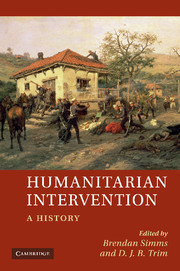Book contents
- Frontmatter
- Contents
- List of maps
- Notes on contributors
- Acknowledgements
- List of abbreviations
- 1 Towards a history of humanitarian intervention
- Part I Early modern precedents
- 2 ‘If a prince use tyrannie towards his people’: interventions on behalf of foreign populations in early modern Europe
- 3 The Protestant interest and the history of humanitarian intervention, c. 1685–c. 1756
- 4 ‘A false principle in the Law of Nations’: Burke, state sovereignty, [German] liberty, and intervention in the Age of Westphalia
- Part II The Great Powers and the Ottoman Empire
- Part III Intervening in Africa
- Part IV Non-European states
- Part V Postscript
- Index
4 - ‘A false principle in the Law of Nations’: Burke, state sovereignty, [German] liberty, and intervention in the Age of Westphalia
Published online by Cambridge University Press: 18 April 2011
- Frontmatter
- Contents
- List of maps
- Notes on contributors
- Acknowledgements
- List of abbreviations
- 1 Towards a history of humanitarian intervention
- Part I Early modern precedents
- 2 ‘If a prince use tyrannie towards his people’: interventions on behalf of foreign populations in early modern Europe
- 3 The Protestant interest and the history of humanitarian intervention, c. 1685–c. 1756
- 4 ‘A false principle in the Law of Nations’: Burke, state sovereignty, [German] liberty, and intervention in the Age of Westphalia
- Part II The Great Powers and the Ottoman Empire
- Part III Intervening in Africa
- Part IV Non-European states
- Part V Postscript
- Index
Summary
You hope, Sir, that I think the French deserving of Liberty? I certainly do. I certainly think that all men who desire it, deserve it. It is not the reward of our Merit or the acquisition of our industry. It is our Inheritance. It is the birthright of our species … A positively Vicious and abusive Government ought to be changed and, if necessary, by Violence, if it cannot be (as is sometimes it is the case), Reformed.
Edmund Burke to Charles-Jean-François Depont, November 1789A more mischievous idea cannot exist than that any degree of wickedness, violence and oppression may prevail in a country, that the most abominable, murderous and exterminatory rebellions may rage in it, or the most atrocious and bloody tyranny may domineer, and that no neighbouring power can take cognizance of either or afford succour to the miserable sufferers.
Edmund Burke to Lord Grenville, Beaconsfield, 18 August 1792To many International Relations theorists and historians of international law, the Treaties of Westphalia which brought the Thirty Years' War to an end in 1648 represent a watershed in thinking about state sovereignty. Before then, the orthodoxy runs, European diplomacy was characterised by the post-Reformation antagonism between Catholicism, especially Counter-Reformation Catholicism, and various forms of Protestantism. Thereafter, so the argument continues, states accepted that religion was the preserve of the ruler; the principle of cuius regio, eius religio, which the Treaty of Augsburg had established in 1555, and which stipulated that populations should adopt the religion of their rulers, was put on a permanent footing.
- Type
- Chapter
- Information
- Humanitarian InterventionA History, pp. 89 - 110Publisher: Cambridge University PressPrint publication year: 2011
- 5
- Cited by



